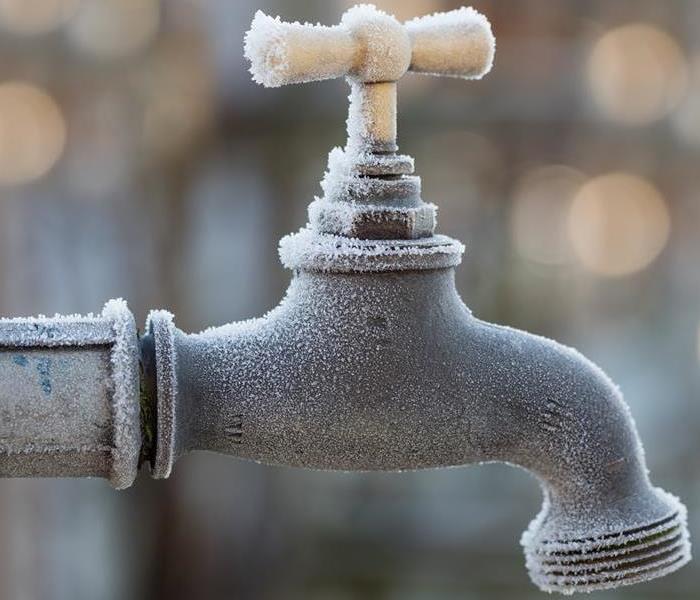How You Can Help Prevent Your Pipes From Freezing
12/6/2018 (Permalink)
 A frozen over outside faucet can be a bad omen for your Greer, SC property. Make sure to take steps to protect your plumbing, inside and out.
A frozen over outside faucet can be a bad omen for your Greer, SC property. Make sure to take steps to protect your plumbing, inside and out.
Winter is coming. (Always wanted to say that in the right context.) And it is coming to the Greenville, SC a few weeks early. A blast of cold air is headed our way, and although there is uncertainty for ice or snow, one thing that is for sure is that temperatures are going to drop. Meteorologists are predicting lows in our area to be in the 20s for a few days next week, and the highs are not much warmer. So, make sure to stock up on bread, milk, batteries, and board games. But don’t forget to prep your pipes.
As a water damage mitigation company, we see a barrage of water losses during winter weather events. And these particular loses come with their own unique set of challenges, water from burst pipes can spill into a home and freeze or the power may be out for days. But the SERVPRO of East Greenville Team has the training and equipment to overcome these challenges and help you and your property recover quickly.
But that doesn’t mean that we can’t share some tips on how to help prevent pipes in your home, business, or facility from freezing and possibly causing major problems.
Keep your thermostat set at the same temperature during the day and night. If you grew up with a penny-pinching family member you might remember phrases like “Turn the heat down during the day, the sun will keep us warm,’ or “Turn the heat down at night and use extra blankets and put on two pairs of socks to keep warm.” My uncle said those exact statements frequently and many times during the same day. But trying to save a few cents can wind up costing a lot. It is a good idea to keep a warmer temperature consistent to help keep indoor pipes from getting too cold. Speaking of…
Open cabinet doors to allow warm air to circulate around indoor plumbing. Keeping indoor pipes warm can prevent them from being the culprits if you do have a pipe burst, and that can limit the damage to crawlspaces or the exterior of the home. Make sure to put any harmful chemicals out of reach of small children or pets.
If you are planning to spend the cold weather somewhere other than home, set your thermostat to 55° or higher, you may not be at home, but your pipes are.
Use insulation to protect pipes in basements, crawlspaces, attics, and the exterior of your home. Insulation tape and water faucet covers can help protect any external faucets, just make sure to disconnect the hose for maximum protection. If a few items at $5 can prevent spending $1000s, sign us up. These can work in the short term, but you may want to contact a professional to install long-term insulation to your pipes under a house or in a basement or attic.
Turn the faucet on. You hear it a lot, but it works. Moving water is harder to freeze than still water. Even a slow drip can be enough to make a huge difference. Running the water in multiple rooms can help even more.
We hope that these tips are helpful, and if you have any additional best practices that you’d want to share, head on over to our Facebook and leave us a comment.






 24/7 Emergency Service
24/7 Emergency Service